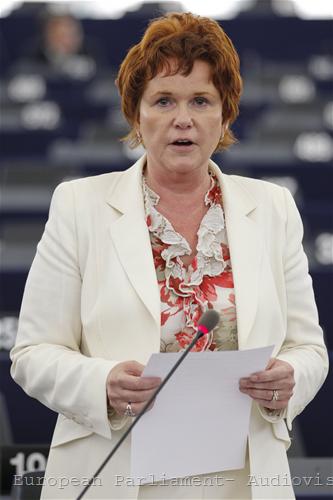Let there be light ... on the derivatives market
Ralitsa Kovacheva, May 25, 2011
 Shedding light on a market, that was completely in the shadows until recently; more transparency and more security – this was the way MEPs commented on the decision of the Committee on Economic and Monetary Affairs to support the draft regulation, proposed by the European Commission for OTC derivatives, central counterparties and trade depositories. The legislation aims to ensure greater transparency of OTC derivatives trading. It is believed that these financial instruments have contributed substantially to the financial crisis because the trade with them had not been regulated in any way, while their volume was enormous - 425 trillion euro in 2009.
Shedding light on a market, that was completely in the shadows until recently; more transparency and more security – this was the way MEPs commented on the decision of the Committee on Economic and Monetary Affairs to support the draft regulation, proposed by the European Commission for OTC derivatives, central counterparties and trade depositories. The legislation aims to ensure greater transparency of OTC derivatives trading. It is believed that these financial instruments have contributed substantially to the financial crisis because the trade with them had not been regulated in any way, while their volume was enormous - 425 trillion euro in 2009.
According to the European Commission proposal, traders of OTC derivatives should provide information on transactions in central data centers, known as trade repositories. They, in turn, will communicate it to the European Securities and Markets Authority (ESMA). For the sake of greater certainty, the Commission proposes OTC derivatives that are standardised (i.e. they have met predefined eligibility criteria), such as a high level of liquidity, to be cleared through central counterparties (CCPs). CCPs (clearing houses) are entities that interpose themselves between the two counterparties in a transaction and thus become the “buyer to every seller”, as well as the “seller to every buyer” (in Bulgaria such an entity is the Central Depository). The aim is to prevent default of a player to cause a "chain reaction" that  would endanger the entire system
would endanger the entire system
According to the Greens/EFA MEP, Pascal Canfin, “A crucial measure endorsed by MEPs today is that the majority of over-the-counter derivatives will be moved to central counterpart clearing houses (as opposed to being held on a bilateral basis). This is an important step to reducing the systemic risk in the financial system”.
After the vote S&D negotiator Leonardo Domenici said: ”This  legislation will be a key tool in the fight against reckless speculation. Our goal was to improve transparency and risk management in over-the counter derivatives market. We have ensured that all meaningful information on derivative contracts is reported and accessible to European and national authorities. This is a core achievement because it will shed light on a market that has remained completely dark until now - as the crisis strikingly revealed.”
legislation will be a key tool in the fight against reckless speculation. Our goal was to improve transparency and risk management in over-the counter derivatives market. We have ensured that all meaningful information on derivative contracts is reported and accessible to European and national authorities. This is a core achievement because it will shed light on a market that has remained completely dark until now - as the crisis strikingly revealed.”
While the new regulation will be applied only to OTC derivatives, MEPs have decided reporting obligation to be applied to all derivative instruments, to  enable the European supervisor to have the full picture. “The volume of all transactions has to be transparent to have maximum stability of financial markets and to enable supervisory authorities to do their work properly. Risk management will not be possible otherwise”, the EP rapporteur on the topic, Werner Langen (EPP, Germany), explained.
enable the European supervisor to have the full picture. “The volume of all transactions has to be transparent to have maximum stability of financial markets and to enable supervisory authorities to do their work properly. Risk management will not be possible otherwise”, the EP rapporteur on the topic, Werner Langen (EPP, Germany), explained.
Regarding the clearing obligation, however, there are exceptions which are clearly described - pension funds for example, which are subject to a special regime, provided that national governments require appropriate guarantees. “We, as a Parliament, are determined to have a piece of legislation with a minimum of exemptions for a maximum of stabilising impact,” Mr Langen noted. MEPs have decided that the clearing obligation will only be mandatory from the moment the regulation enters into force and will not be applied retroactively.
 S&D spokesman for economic and monetary affairs Udo Bullmann pointed out that "Even though this legislation is a major step forward, there are still a number of issues which need to be tackled as soon as possible. One of these is speculation on commodity markets, which makes food prices spike. We are therefore calling on the European Commission for specific provisions to prevent systemic risks and manipulative practices in the forthcoming reviews of the market in financial instruments directive (MiFID) and the market abuse directive".
S&D spokesman for economic and monetary affairs Udo Bullmann pointed out that "Even though this legislation is a major step forward, there are still a number of issues which need to be tackled as soon as possible. One of these is speculation on commodity markets, which makes food prices spike. We are therefore calling on the European Commission for specific provisions to prevent systemic risks and manipulative practices in the forthcoming reviews of the market in financial instruments directive (MiFID) and the market abuse directive".
The new regulation will be subjected to voting in plenary in July. Only then the negotiations with the Council will begin and if they are completed in time, the new standards could be ready by the autumn, EP rapporteur Mr Langen said. “That would require, however, more determination on the part of the Member States for real market transparency and a minimising of risks associated to derivatives”. As part of the efforts for a better regulation of the financial markets, in early June the European Parliament will discuss the new legislation on short selling and credit default swaps. The negotiations between the Parliament and the Council on the topic have already started.
 | © European Parliament- Audiovisual Unit
| © European Parliament- Audiovisual Unit | © European Union
| © European Union | © European Commission- Audiovisual Service
| © European Commission- Audiovisual Service | © European Union
| © European Union | © REGIERUNGonline/Bergmann
| © REGIERUNGonline/Bergmann | © European Union
| © European Union | © European Parliament
| © European Parliament | © The Council of the European Union
| © The Council of the European Union | © European Parliament
| © European Parliament